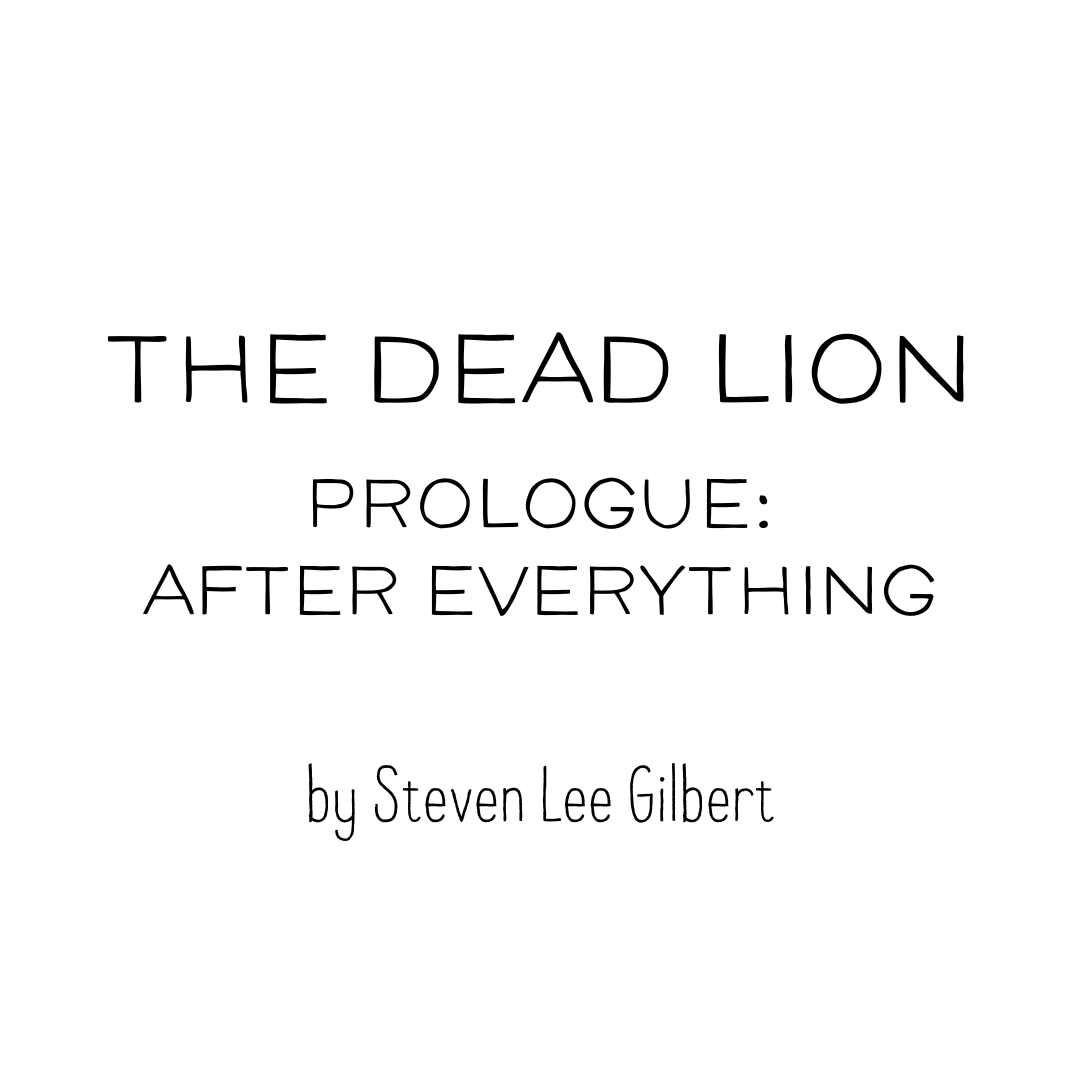
After Everything
Of all the grim journeys a soldier may face none may be more daunting and unpredictable than returning home from war.
The Dead Lion
by Steven Lee Gilbert
If at the end of a war story you feel uplifted,
or if you feel that some small bit of rectitude
has been salvaged from the larger waste,
then you have been made the victim
of a very old and terrible lie.
—Tim O’brien, The Things They Carried
Shut up, shuttin’ up!
— Yosemite Sam
After Everything
Only a handful of mourners are present, standing together at the foot of a mountain on a narrow spit of lawn, like a knot of sullen protestors huddled beneath the rain-drenched sky and mushrooming plume of umbrellas. Their faces are turned down and their shoulders squared off against the wet and the cold and the melancholy note of mortality, while a gray-bearded man in a camouflaged jacket addresses the solemn congress. He is sharing a few words, presumably, of the figure wrapped head to toe in a white burial shroud and presented before them on a long willow frame set on four equal risers of gray cinder block. His voice is low, muffled against the falling rain which has begun in some places to soak through the thin ceremonial fabric giving way to patches of grayish-pink flesh. A broad forehead, the bridge of a nose. A pair of prominent cheek bones. One hand resting atop the other.
At the edge of the assembly, a young woman pokes her head from beneath an umbrella and jeers skyward, her eyes are puffy and red and harden with admonishment as they fixate on the foul weather. Her jaw hardens too as she turns and leans over the head of a child to speak in the ear of the tall, balding man standing next to him. Who in return offers barely a look, a single, slight shake of his head. The woman straightens and stares. She says something more in his direction and before he can register any further dissent she passes the boy her umbrella and turns out into the rain.
She hurries across the lawn toward a woodshed where there loiters a short, round man with his back to the service and dressed in the full Highlands costume. Scottish green kilt, black feather bonnet, tartan piper’s plaid. She taps him on the shoulder and the man turns. She gestures to the bagpipe he has cradled in his arms and draws a for him a series of tiny, tight agitated circles in the air. The bagpiper smiles and nods. He fingers the blowpipe to his mouth. Then stops abruptly and floats through clenched jaws this one question: Sorry for asking, but who again is it we are burying?
Edith:
I remember the day, the very minute in fact, John David told us he was joining the Army. He was eighteen, I was twelve. We’d just sat down to dinner. His graduation was the next day and so Daddy was pressuring him about going to college again, using the same arguments, income and opportunity, that he would later give me—right up until I got pregnant. John David had made his mind up though and so he sat there not saying a word. After a while, Daddy did the same. The two of them sitting there stewing and picking over their plates, until the silence got too big even for them and one of them had to say something.
You’re sure about this? Frank asked.
Pretty sure, answered John David.
A decision this big, seems you ought to be more than just pretty sure.
John David looked across the table at his sister. Would you please pass me the beans, Edie?
Edith looked at him oddly, as if he’d spoken to her using some unfamiliar language. The beans, he said again.
So when might this happen? Frank pressed.
John David shrugged as he piled more beans on the ones he’d not eaten. All depends on the needs of the Army.
The needs of the Army?
That’s what they said.
That sounds like a thing a recruiter might say. Did they at least give you some indication?
Sure.
Well like what?
John David shrugged. Different things.
Edith sat watching them. Neither had yet to mention there was a war going on.
Why dont you share just one of them, Frank suggested.
Maybe infantry.
Infantry?
That’s right.
And the others?
You know. Intelligence. Supply. A truck driver.
A truck driver? Edith blurted. You hate even driving the tractor. You joined the Army to drive a truck?
John David leveled his eyes on her. That’s not why, he said.
Then what is? Frank interjected.
It doesnt matter. John David leaned back in his chair. I’d do whatever they asked.
No one spoke for a few long seconds then Edith drilled her brother with the best icy stare she could muster and said, Well, I think that’s absurd.
Later, the mourners all retreated to inside the house but for the woman, who stands beneath the woodshed wearing a rain jacket and slipping a pair of tall mud boots over her hosiery, while another, a man, waits nearby, holding two long handled shovels. When the man leans down and gets her attention and points toward the house, at the lone figure there jogging toward them, Edith, straightens and turns. She sets her resolve and her hands on her hips as if she knows exactly what to expect and waits for it to arrive.
What are you doing, Edie? the man asks as he wipes the rain from his head and face.
You know what I’m doing.
I thought we said it could wait.
You said that, Jordan, not me.
Jordan thrusts a hand toward the sky. It’s fucking raining, for chrissake.
I can see that.
Jordan glances at the shovels, then pulls himself fully erect. As if bearing alone might weaken his sister’s will. As if all of her life hadn’t prepared her for this, a man’s machismo. People are waiting, he says.
I dont care, Edith answered. I’m not leaving him like this.
They both turn, look at the figure lying now like a chord of deadwood beneath a blue tarp. Further back along the woodline rest two more gravesites, one more recent than the other. Next to them sits a pile of freshly dug dirt and alongside the dirt stands a tractor. Please, Edith, Jordan implores, come inside. No, she replies. John David wouldnt wait on the weather. Daddy wouldnt either. And by God neither will I.
A commotion arises from the house. Someone calling and waving their arms, loping like a wounded simian-creature across the lawn. The two watch without speaking as he steps under the canopy and lowers his hands to his knees. He alternates glances, unsure, it appears, which of them to address.
What is it, Brian? Edith asks with impatience.
Someone’s here to see you, he says. From the Army, I think.
They didnt say?
Brian stares blankly at her. Edith rolls her eyes and flips the rain hood over her head. She takes one of the two shovels and starts toward the grave and the work to be done there.
What do I tell him? Brian calls out to her.
The same thing they told John David, she answers and raises one middle finger toward the foul sky. Tell them to go fuck themselves.
Edith:
The truth is everyone failed him, not just the Army. Everyone. You. Me. Daddy. The whole fucking country failed him. Failed all of them, in fact. And honestly, what were we even thinking? How can any of us begin to even understand? We send them away, ask them to commit these horrendous, awful things and afterwards they come home, many like him, unhappy and broken, having lost just about everything, their entire lives hanging by a thread. And what do we do? What do we do? We throw them a fucking parade. A fucking parade. We thank them for their service. Applaud their sacrifice. Pretend to understand the magnitude of their loss, of their pain and hurt. The truth is, we know nothing. We think we do, but we dont. And so we leave them alone to deal with all that bullshit as best they can. Like victims. Like outcasts, without hope. Without purpose. Without any new plan for going forward. I mean really, after what happened to him, what in hell did we expect John David to do? Carry on like nothing fucking happened? Please.
Show your love & support
As an independent, reader-funded operation, I rely on the backing of readers willing and able to financially support work of this nature. Behind my desk there is just me, seeking to prove in any way that I can, unencumbered by shareholders or billionaire owners, that it is possible to cut through the bullshit of what we're taught about life and find the means to live longer, better, with less, wherever we are.
If you find my writing here to be living up to those intentions or otherwise enriches your own life in any way, please consider supporting it with a one-time donation or paid subscription. Your support makes all the difference!
Monthly Subscriber
Become a re-occuring sustainer with a monthly subscription. Choose from several affordable levels. Annual subscribers earn a 17% discount. Sign up today and help yourself to an additional 20% off (read more).
♥ $5 / month, $50/year
♥ $10 / month, $100/year
♥ $25 / month, $150/year
One-time Donation
Light up my life and give me hope with with a one-time donation in any amount.
Keen on the Bitcoin? No problem. Mine it and shovel a bit (or two) my way: bc1qn56cg3htqq77zm4y06900m0u05xpy57zxkkmz9
Need to cancel an existing subscription? I do hate to see you go, but I understand, life happens. Visit this page to do so.



